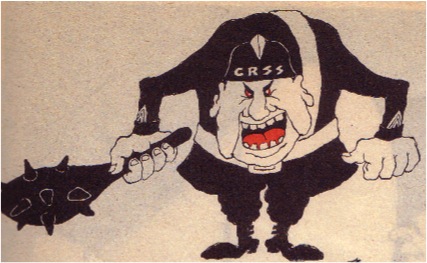Policing, Pacification, and Prisons: Coercive Governance in French Culture, History, and Thought from 1925 to the present
| Module Code: FR325 |
|---|
| Module Name: Policing, Pacification, and Prisons: Coercive Governance in French Culture, History, and Thought from 1925 to the present |
| Module Coordinator: Dr Oliver Davis |
| Fridays 09.00-11.00 in H4.44 |
| Module Credits: 30 |
Module Description
Over the two terms of this module we examine the French policing, criminal justice and prison systems from around 1925 to the present day. We engage with a range of different types of written material, as well as several films, in their historical context and sample a corresponding range of different disciplinary areas and analytical approaches: history, literature, film, sociology, social and political theory, policing and prison studies, critical security studies.
The module's aim is nevertheless coherent and straightforward: to examine those techniques which the Modern French state and its institutions use to try to force people to do things they would not otherwise choose to do ('coercive governance') and the many ways in which such techniques have been resisted. Forms of resistance range from the prison break (we discuss the gripping account by convict Henri Charrière, Papillon, of his escape attempts from the penal colony in French Guiana in the 1930s) to the more sophisticated moves by one prison campaign group, le Groupe d'information sur les prisons (GIP), to break down some of the barriers between prison and the wider society in the early 1970s. The other questions which this module addresses include:
- Who exactly are the police in France today and why are they generally less trusted and respected than their counterparts in Britain?
- How has the treatment of young offenders changed since the 1920s and what does this tell us about the wider society?
- Why have some particularly effective policing techniques (such as torture) been used widely in the colonial context of 'pacification' but not on the mainland?
- What is the purpose of imprisonment, how effective is it and how has the prison been understood and subverted?
- How did the way in which la banlieue was policed contribute to the 2005 riots and how were these riots controlled and understood?
- What are some of the key dimensions of French public and policy debates on 'dataveillance'?
- What is distinctive about the French public and policy approach to counter-terrorism and security today?
The assessment for this module has been significantly revised for 2018-19 (please see below for details) in order to focus on developing students' presentation skills and skills of extended analytical writing, both of which are essential transferable skills for employment in graduate-level jobs. One of the first group of students to follow this module won the Association for the Study of Modern and Contemporary France's annual nationwide undergraduate student essay prize for her summative essay. For more information about the core texts or with any questions about this module please don't hesitate to contact me.
Assessment Method
The introduction of summatively assessed presentations is in response to student feedback and is informed by Employability considerations: presentation skills are frequently assessed formally as part of the selection process for graduate-level jobs and this module aims to help you perfect these essential skills. Presentations will be assessed in accordance with the SMLC criteria. Every student will have the opportunity to do at least two practice (formative) presentations during the year and receive detailed feedback on them to help prepare for the summative presentation.




